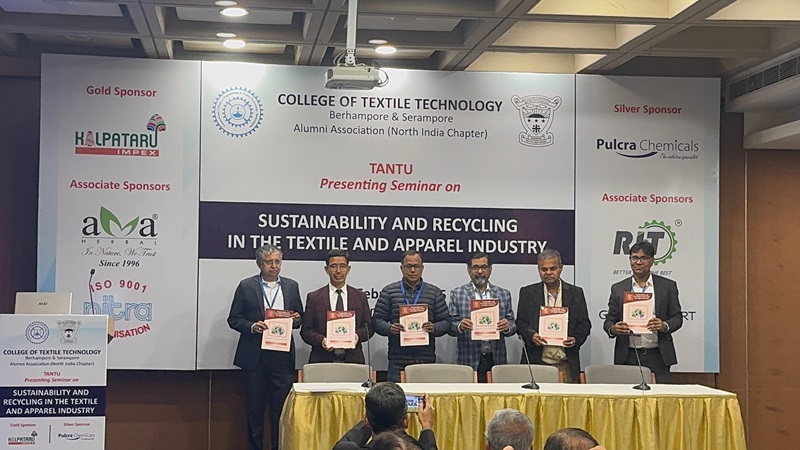
TANTU Seminar at India International Centre brought together experts, policymakers, and industry leaders to address sustainability and recycling in the textile and apparel industry. The event focused on waste reduction, circular economy practices, product life cycle analysis, and sustainable manufacturing.
Eight distinguished speakers shared insights on sustainable practices, technological advancements, and policy initiatives shaping the industry’s future.
Ashok Kumar, Deputy Director General, Bureau of Energy Efficiency, New Delhi, delivered the keynote address, emphasizing immediate action on sustainability. He reminded attendees of the Paris Agreement’s goal to limit global warming to below 2 degrees Celsius and achieve net-zero emissions by mid-century. He stressed that the time for research and discussion had passed, and the industry must act now.
Innovations in recycling and performance textiles
Gaurav Seth, Head of Strategic Partnership at Indo-German Yarn and Fibre LLP, highlighted the challenges of recycling technical textiles. He discussed successful methods for re-engineering performance fibers like para-aramid, meta-aramid, and carbon fibers. These recycled products are now being supplied to manufacturers, reducing waste and environmental impact.
Ajitesh Upadhyaya, Senior Section Expert at BEE India, outlined India’s Carbon Market Framework, Carbon Credit Trading Scheme (CCTS), and its alignment with international carbon tax regulations. He detailed how the Perform, Achieve, and Trade (PAT) scheme is helping the textile sector achieve energy efficiency goals.
Compliance and the role of LCA
Chinky Tyagi Khare of Green Story spoke about sustainability regulations and product life cycle assessment (LCA). She warned that manufacturers risk losing business and damaging their reputation if they fail to provide environmental footprint data, as responsibility shifts up the supply chain. Green Story’s tools are aiding companies in assessing and improving their sustainability credentials.
Independent sustainability consultant Pankaj Kapoor discussed climate change's impact on the textile industry. He outlined key sustainability metrics and ESG regulatory deadlines, emphasizing that the industry must prepare for stricter compliance by 2025.
Abhijit Majumder of IIT Delhi shared research on post-consumer textile recycling. His team has successfully regenerated yarns for fully fashioned apparel, demonstrating the potential for closed-loop recycling in fashion.
Industry’s role in sustainability
Sutanu Goswami, Senior General Manager at TUV SUD South Asia, urged the fashion industry to rethink its environmental impact. “By adopting responsible sourcing, ethical production, and recycling initiatives, we can move towards a more sustainable future,” he said.
Sanya Arora, Engagement Officer at CDP, emphasized the growing need for disclosure, particularly for SMEs. Transparency in environmental reporting is now a business necessity, she noted.
Arindam Basu, Director General at NITRA, and Lalit Goswami, Senior Scientific Officer at NITRA, presented research on optimizing process parameters for using recycled cotton in yarn production. They noted limitations in blending recycled cotton, with a maximum of 20 per cent for ring spinning and 30 per cent for rotor spinning to maintain quality.
The seminar concluded with a collective commitment from stakeholders to improve transparency, invest in recycling infrastructure, and support policies that drive sustainability. The discussions reinforced the urgent need for industry-wide collaboration to create a greener, more responsible textile sector.












